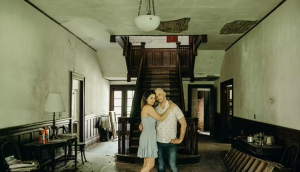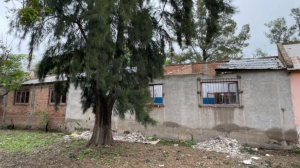
By Drew Savage
Valentine’s Day falls on Saturday, 14th February 2004. Marco Pantani has been alone since Monday in Room 5D of the Residence Le Rose in Rimini, an Italian resort on the sea. He’s been acting oddly.
Pantani would have been at his peak if Lance Armstrong had not won four Tours de France in a row. Armstrong was a year-and-ahalf younger than Pantani and he just happened to be about to take the third Tour de France. Pantani is in the spotlight now for three years, earning him the nickname of ‘Il Pirata.’ He has a bandana on his head and nose, wears earrings, has a pierced nose, and wears a shaved-head.
He was a swashbuckling folk-hero in the early days of cycling. The American claimed a Courchevel stage after he had fought back against Armstrong and his dominance. The most watched event on Italian television in history is still the cycling race.
Pantani complains to reception about the room that is next door, which is not occupied, three times in the middle of morning. After 11:00 he asks that police be called.
Panani became a climber classic because of his thin, small frame, sharp cheekbones, powerful lungs, and sharp cheekbones. Panani’s ability to survive in thin mountainous air helped him win the Giro d’Italia, and then the Tour de France. This feat was only achieved by six other cyclists. He was included in the pantheon with Fausto Coppi Eddy Merckx and Bernard Hinault.
Pantini, despite being a celebrity superstar, was not as popular in 2004. The frame was fuller and he weighed 20 kilograms more than his previous racing weight.
His race was a disgrace. He had led by over five minutes in the Giro d’Italia with two stages left.
Italian police removed him from the hotel of the Italian team after failing to pass a test the morning of stage five.
Pantani’s teammates cheered him from the hotel balcony. Fans blockaded the road to protest.
Pantani told reporters at the time that “morale has been shattered after two large accidents. “.
Pantani arrived in Rimini when he reached this junction. He was thrown into a world of darkness, from which he had no escape.
After consulting the owner, the receptionist visits Room 5D in the evening under the pretext that she will be bringing fresh towels. No response is received when the receptionist attempts to knock on the room’s door. Receptionist attempts again to knock on the door after another discussion with his manager. Marco Pantani was found dead in the room after unlocking it with the master key.
Pantani has left a legacy that is full of glory. However, not everyone was enamored with him. Many may even want him dead.
Marco Pantani was raised in a typical working-class Italian family. His hometown is Cesenatico which lies 14 miles away from Rimini.
When he was a teenager, his neighbor recommended that he join a cycling club in the area. This led him to become one of the greatest climbers ever.
Pantani’s time trials were a breather compared with the dominance of riders like Miguel Indurain or Jan Ullrich. Fans of the more romantic side of cycling referred to these riders as ‘winning machine’, who were hard to hate but difficult to defeat.
Pantani, a mountaineer who made his opponents gasp for air in the high mountains was the antidote.
Pantani stood out. He was an outcast. He sang late at night, ate Nutella and didn’t have a safety helmet.
Matt Rendell’s biography of Pantani, a cycling journalist, stated that Pantani wanted his bike to be used as a brush.
Pantani won millions of hearts, and not just for the reasons he did. He was known for his style, panache, as well as the way that he rode on mountains, hands gripping the drops, while hunched up over the handlebars. He seemed to fly past everyone else, despite not breaking a single sweat. The pirate rode his bicycle with glory and death on his mind.
He outlined his race strategy insofar as it concerned, following a decisive 1998 Giro stage win at Montecampione.
“I had no alternative. It was a matter of strength. I had no alternative. I was stuck. “He said.
He broke the record of the fastest climb to Alpe D’Huez in the 1994 Tour de France. It was a nearly mythical ascent with 21 hairpin turns.
No other Tour rider has beaten those three climbs up Alpe d’Huez. In 1995 he did it again. In 1997, the record was within four seconds.
A year after that, he had achieved his greatest glory.
A Festina team official was caught carrying performance-enhancing drugs during the 1998 Tour, and the team was expelled, riders arrested, and the peloton went on strike.
Ullrich, the champion defending in yellow, was the only hero the race could have. Enter Pantani. Ullrich was only three minutes back.
Pantani has turned the race upside down on a wet, cold day in the Alps.
Pantani, who took risks and risks, in what was probably apocalyptic conditions, gained nearly three minutes over Ullrich. Pantani broke on the final ascent, and Ullrich stayed safe behind him.
During the television broadcast, Pantani stormed through the fog up into Les Deux Alpes and on to the finish. He had nine extra minutes by the time he reached the finish of this 15th leg, after Ullrich’s calculations proved to be disastrous.
Pantani’s bet would see him wear the yellow jacket all the time to Paris.
Pantani’s 1998 career seemed to be at its peak, but ten months later he was thrown out of the 1999 Giro for dominating two stages.
Italy’s devoted fans, the ‘Tifosi,’ as well as peloton were stunned to hear that the Pirate was not crowned. Due to the lack of a reliable blood-boosting drug Erythropoietin test, riders had their health limited by 50% due to his haematocrit level being 2 percentage points higher than that limit.
Many cyclists, who have failed tests, simply accept the ban as a job hazard, serve their sentence, and return to their career. David Millar of Scotland became a champion for clean cycling.
Pantani, who was temporarily banned from the racing circuit after failing to pass a health check, saw the beginning of his end.
The people who knew him said that he started using cocaine on a regular basis then.
Indurain summarized what happened after Pantani died in 2004.
The haematocrit result complicated his entire life, and he never recovered. After the haematocrit, he was changed forever.
Pantani was still popular, but he became more paranoid as a result of the constant disputes he had with Italian authorities and cycling’s governing body.
Pantani had been treated in a depression and drug clinic. In October 2003, he asked his fans to ignore him.
Pantani, on a holiday to Cuba, scribbled his passport.
He stated, “I no longer am the champion that I was.” “.
My fans are not cheering me out of love, but because they want a character.
The humiliation I received was for no reason. In the last four years I have appeared in all courts. Yes, rules are in place – they’re the same everywhere.”
These words, discovered four months after the discovery of his passport in his hotel bedroom, became known to all.
Tonina hurled abuse at the journalists who attended his funeral. She said: “You all are to blame for my child’s death.” What are you doing ?”?”
Over 20,000 people lined Cesenatico’s streets to watch the coffin being carried from the church.
Pantani’s initial death was ruled to be an accidental overdose of cocaine, but that is not final.
A second inquiry in 2016 was initiated after Pantani’s family said he was beaten, made to drink cocaine, and killed by a group. The second investigation was opened in 2016 after the family of Pantani claimed that he’d been murdered, beaten and forced to drink cocaine by men.
Italian authorities have announced a third inquiry into Pantani’s 1999 disqualification and death, five years after that. This investigation will be focusing on the involvement of the Mafia.
An investigation began when a piece of new evidence was discovered by chance.
Lorenzo Bodrero’s Pantani: The Death of A Pirate, an investigative journalism book, says that one of those men had mentioned to the other the Camorra’s involvement in Pantani’s murder. However, this was not related to Pantani’s case.
There have been many reports about mafia involvement for years. This is because the syndicate of organized crime would have suffered a large loss on the unlicensed betting markets if Pantani had won the Giro in 1999.
In the process, they had discovered evidence that appeared to back up their theory.
Fabio miradossa was also a witness. This dealer supplied Pantani, towards the end, with drugs.
Bodrero said that the guy who sold him coca was this person.
Miradossa claims that Pantani was a cocaine user, but not in the way that could have caused him to succumb to his addiction within days.
Pantani’s failure to pass the blood test during 1999 Giro was predicted by a mafia contact, alleged renowned criminal.
Their reputed advise is to “bet against Pantani” if one has money.
Matt Rendell is Pantani’s biographer and has long been sceptical about mafia allegations.
“As a general rule, Camorra won’t fix something by trying to contact the haematology section of a Como-area hospital,” he said in an interview with BBC Sounds. This is not how it works. The overall tone is a little cruder.
But a government-appointed commission that investigated mafia crimes was not so sure.
Nicola Morra is the president of Parliamentary Anti-mafia Commission. She says that it’s still possible the mafia tampered with the results in the Giro d’Italia.
We haven’t been able, despite our best efforts to eliminate it completely as we would like.”
Commission found “several, serious” irregularities in blood test from 1999 Giro. The rules to maintain riders’ anonymity required that the blood test tubes containing Pantani’s blood be identified only by their number. However, they were marked with Pantani’s name.
Pantani’s sample of blood had been collected an hour before the time indicated by a prior court, which could have led to tampering.
The commission states that it is possible for the sample to be manipulated by placing Marco Pantani’s time correctly at 07:46.
Pantani may have caused his own drug-test result. It is possible that the drug testers caught a cheater.
Christophe Bassons was a French pro cyclist at the time who insisted that he ride clean. He said 95% were taking EPO.
As detection technologies improved, retroactive testing on urine samples from the Tour de France in 1998-1999 partially confirmed his estimates.
Pantani and 12 more riders were also deemed suspicious after their EPO tests came back positive.
Nevertheless, there were riders who managed their haematocrit test by timing their EPO consumption and avoiding the drug-testers.
Pantani, when he was escorted from his team’s hotel, Pantani thought he had not cheated more than any of his rivals.
Pantani, his mother says, left notes which support the claim.
She confirmed to BBC Sounds he had never written ‘I don’t have any’. He told BBC Sounds that he only did what he could do.
Pantani could have become isolated and resorted to cocaine due to the injustice of being denied the opportunity at home.
There are other anomalies that surround his death.
Giuseppe Fortuni was at the University of Bologna when he said that Pantani had a body containing more than six-times the amount of cocaine required to be lethal. Fortuni conducted the tests on Pantani’s corpse.
Pantani would not have attempted suicide if he was intending to do so, according to the coroner. He also believed that the drugs he carried with him were prescriptions.
Miradossa is Pantani’s dealer of drugs. He may not always be reliable but Miradossa casts doubts about the circumstances surrounding Marco’s murder.
The Italian Anti-Mafia Commission heard him say, “I believe Marco was killed because he was searching for something.”
Marco, according to what I saw and experienced and from the photographs and videos taken in that room, did not use drugs.
Pantani preferred smoking cocaine. However, there were traces of cocaine all over his body that suggested he may have sniffed the drug.
Miradossa concluded, “Marco did not sniff. So whoever was responsible for the crime scene didn’t know this.”
Tonina Pantani’s campaign for a further investigation has focused on her son’s murder.
The number of things was overwhelming. BBC Sounds reported that she had heard “Strange things…not Marco’s habit”.
The most likely scenario is that he slept below [the TV] rather than above him (in the mezzanine, where the body of the deceased was discovered).
When I asked the manager of the hotel if there were any damages, he replied, “No ma’am, it was not broken. It was all just taken apart.” What in the world were they looking at?
Marco was in the casket. I touched him and his hands. He made a huge mess, but he didn’t scratch himself. I saw scratches on his cheeks that led me to wonder if it was a result of a beating.”
Tonina said that the baseball cap of her son was also missing. She claimed that two jackets that were found in his room weren’t even his.
Here are the details.
Two containers made of aluminum at the site once held Chinese food that Pantani disliked.
According to reports, the second entry of the Residence Le Rose is not monitored with CCTV. This allows third parties enter and leave discreetly.
Pantani’s room allegedly held 20,000 euros (17,000 PS) or 12,000 euro (10,000 PS).
You may be able to understand what occurred in the Room 5D by looking at these details.
Pantani could have destroyed the room by himself, if he was paranoid or under the effects of drugs. He was high on cocaine during a vacation in Cuba at the end of last year.
John Foot, professor of Italian and modern history at Bristol University, is one of the many who do not believe that Pantani’s demise was an accident.
BBC Sounds reported that he was “saddened” by the reopening of the case. For me it is clear that this was a cocaine overdose. The evidence presented to me is convincing.
He won’t be at ease if we continue down this path.
This story was not very interesting, so the rummaging will continue.”
At the moment, Rimini is conducting an investigation behind closed door into Pantani’s death. When the investigation’s results will be made public is not known.
Perhaps the only certainty we have is that no one, except Marco Pantani will ever be able to tell us for certain what took place in that Rimini Hotel room.
Even though truth and legend may be dead, they still live on.
Rendell recalls that “this extraordinary child didn’t breath, sweat or pant… he did not even appear to be trying, but could simply fly away”.
In a world where he lived another life what could he possibly have become?
We didn’t look any further because of his sport at the time and life.
Our lobby renovation service is second to none at https://ncrestoration.ca/. Our skilled team of designers and artisans are dedicated to bringing the vision you have for your space to reality. Our team of designers and craftsmen will carefully tailor every detail to your specifications, lobby renovation and design including the colors, layouts and materials. We will seamlessly guide you throughout the entire process. Call us for an estimate, or to find out more information about our services.





